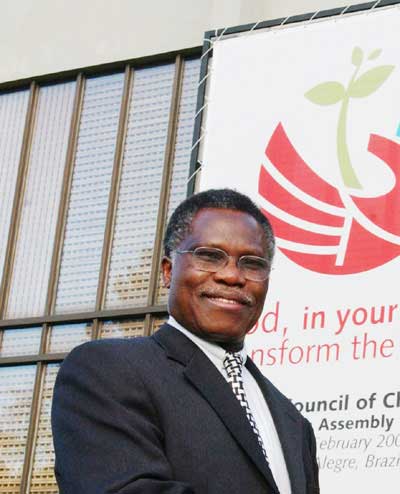ACT Development constituted by 55 churches and organisations

February 26, 2007
By pwrdf
PWRDF included in global brand for church development work
“There is a strong sense that we need each other as partners in the ecumenical movement. We have crossed an important threshold with this Assembly. There is now the promise of increased and more carefully targeted co-operation this will lead to beneficial results for our partners at grassroots and national levels”. Rev. Samuel Kobia, General Secretary of the World Council of Churches, addressing the first ACT Development Assembly on February 7, in Nairobi Kenya.
ACT Development, the new global alliance for development, has been officially formed after two years of consultations and planning. The alliance celebrated its first assembly on February 5-7 in Nairobi, Kenya, hosted by the All Africa Conference of Churches.
By working collaboratively, the alliance aims to increase the effectiveness of ecumenical work on poverty, injustice and human rights abuse. The alliance brings together 55 ecumenical organisations and churches, collectively running programmes in 157 countries with more than 14,000 staff and with a combined budget calculated to be in the vicinity of US$1 billion.
The Assembly considered the future direction of the alliance as well as its mechanisms and programmatic activities.
It was agreed by the Assembly that ACT Development should continue discussions with ACT International, the churches global alliance for emergency response, to explore possibilities of a structural relationship between the two alliances. A close working relationship will also be maintained with the Ecumenical Advocacy Alliance.
By developing a global brand – using a shared family name among organisations in the alliance – ACT Development aims to enhance the visibility of the development work being carried out by the ecumenical family. It was unanimously agreed by the Assembly that the alliance should continue to work with branding consultants towards the sharing of one family name: ACT (Action by Churches Together).
Emphasising the importance of a global brand, Kobia told the Assembly that “a visible presence of specialised ministries at the international level is absolutely required involvement in strategic global advocacy has become a must”.
The Assembly affirmed that at the national level, a forum will be established by ACT Development organisations working in the country as the basis for collective discussion, learning, analysis and planning.
A 12 seat Executive Committee was elected that will be chaired by the World Council of Churches. Member churches of the World Council of Churches, their development departments and other ecumenical organisations working in development are encouraged to take part in  ACT Development.
ACT Development.
What will ACT Development do?
Participants in the Alliance will:
- commit themselves to high quality development work based on shared values
- meet together at the national, regional and global level to reflect on their development work, share analyses, and plan cooperative activities
- undertake joint development programmes
- work collaboratively in advocacy
- share a family name (through co-branding their organization’s name with the name of ACT Development) and enhance the visibility of the ecumenical family’s work in development.
What won’t ACT Development do?
ACT Development is not a mechanism for transferring funds between donor and implementer. In this way, it is different from ACT International which mobilizes resources for implementers to use in emergencies. Participants in ACT Development will continue to decide who they support or receive funds from and bilateral funding will continue.
Current Membership
Organisations forming part of ACT Development at the time of the assembly are:
All Africa Conference of Churches (AACC); Amity Foundation, China; Bishopric of Public Ecumenical and Social Services (BLESS), Egypt; Bread for All, Switzerland; Bread for the World, Germany; Canadian Lutheran World Relief (CLWR); Centro Regional Ecuménico de AsesorÃa y Servicio (CREAS), Argentina ; Christian Agency for Rural Development (CARD) India; Christian Aid, UK and Ireland; Christian Care, Zimbabwe; Christian Commission for Development in Bangladesh (CCDB); Christian World Service (CWS) Aotearoa New Zealand; Church of Sweden, International Mission and Diakonia; Church World Service, Inc. (CWS), USA; Churches Action in Relief and Development (CARD) Malawi; Church’s Auxiliary for Social Action (CASA), India; Comisión Cristiana de Desarrollo (CCD), Honduras; Comisión de Acción Social Menonita (CASM), Honduras; Comunidad Cristiana Mesoamericana (CCM), Central America; Consejo Latinoamericano de Iglesias (CLAI), Latin America; Coordenadoria Ecumênica de Serviço (CESE), Brazil; Coptic Evangelical Organisation for Social Services (CEOSS). Egypt; Council of Services and Development. of the Synod of the Nile Evangelical. Presbyterian Church, Egypt; DanChurchAid, Denmark; Ecumenical Association of Churches in Romania (AIDROM); Ecumenical Church Loan Fund, ECLOF International; Ecumenical Committee for Social Development (CEDES), Mozambique; Episcopal Relief and Development, USA; Ethiopian Orthodox Church: Development and Inter-Church Aid Commission; Evangelischer Entwicklungsdienst e.V (EED), Germany; Federación Argentina de Iglesias Evangélicas (FAIE), Argentina; FinnChurch Aid, Finland; Finnish Evangelical Lutheran Mission; Fundação Luterana de Diaconia, Brazil; Fundacion de Ayuda Social de Las Iglesias Cristianas (FASIC), Chile; HEKS/EPER (Swiss Interchurch Aid); ICCO, the Netherlands; Icelandic Church Aid; Iglesia Evangélica del Rio de la Plata , Argentina; International Orthodox Christian Charities (IOCC), USA; Liberian Council of Churches; Lutheran World Federation (LWF); Lutheran World Relief, Inc., USA; Methodist Church of Great Britain; NCCA Christian World Service, Australia, Norwegian Church Aid,; Philanthropy Charitable Fund of the Serbian Orthodox Church, Serbia ; Presbyterian World Service and Development, Canada; Primate’s World Relief and Development Fund, Canada; Social Health and Education Development (SHED), Bangladesh; Synodical Board of Social Services, Church of North India; United Church of Canada Justice, Global and Ecumenical Relations Unit; United Evangelical Lutheran Church in India; WCC Armenia Inter-Church Charitable Round Table Foundation; YAKKUM, Indonesia.
For media requests, please email Communications and Marketing Coordinator Janice Biehn at jbiehn@alongsidehope.org.
